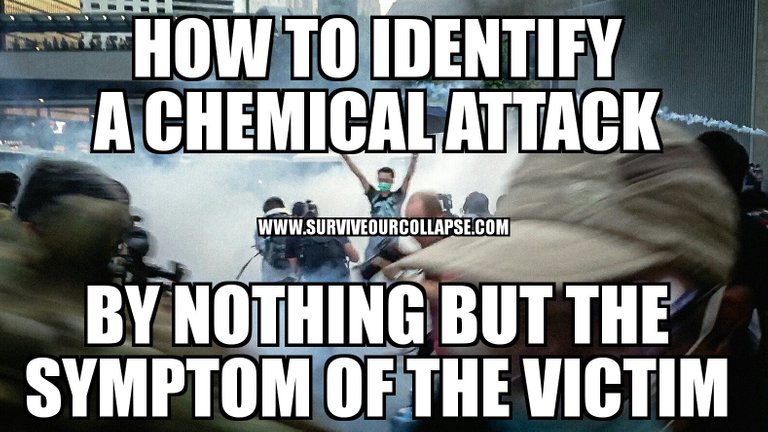
Chemical attacks: How to identify them by symptom.
Chemical attacks rarely happen state side, but history tells us that chemical weapons have been used quite frequently over the past century. Most notably in other nations. As terrorist domestic and international grow in size, so does the possibility of a terrorist act. Anyone keeping a watchful eye on the daily news would see the trend of terrorist activity spiking in the USA. To say the USA is impervious to a chemical attach based on our nations civility would be thinking wishfully. This section will break down the 5 primary categories of chemical weapons as well as their symptoms. The primary objective of this section is to learn how to identify a chemical attack based on symptom alone.
in 1993 the Chemical Weapons Convention (CWC) required most nations to destroy large stockpiles of their chemical weapons, labeling them as weapons of mass destruction (WWMD'S). Three nations continue to openly hold stockpiles of WWMD's, the USA, Russia and North Korea. There have been concerns that other nations may have held on to their WWMD's without declaring them, and terrorist organizations may be producing new quantities of chemical weapons to meet their organizational goals.
These symptoms range from obvious to barely recognizable, however the majority of them can still be rapidly lethal. Understanding these unique symptoms make it easier for one to determine what chemical agent is present.
The 5 primary chemical weapons used today are as follows:
1. Choking Agents
Choking Agents:
A choking agent will fill the victims lungs with fluid, causing them to frown on the spot. The two most popular chocking agents are chlorine gas and phosgene.
Minor Symptoms from exposure: Headache, blurred vision, burning throat and vomiting.
Severe symptoms from exposure: Tight or restricted chest and breathing, thick burns on the skin or eyes.
Fatal symptoms from exposure: Failure of the respiratory system. Circulation failure.
The main symptom to identify when determining whether or not a choking agent is present if the coughing up of bloody phlegm.
Nerve Agents:
Nerve agents are primarily absorbed through the skin. Symptoms from exposure can be rapid depending on the concentration and exposure level. Nerve agents are the most dangerous and lethal, which is probably why the majority of the stockpiles left in the world are in fact nerve agents. They are extremely effective in weapon form when released in a cluster bomb formation. Their reach great distances.
Nerve agents have been in use by terrorist organizations in the past such as when the Syrian Military fired rockets with chemical agents (Sarin Nerve gas) fired at about 12 areas in suburbs south and east of Damascus, targeting rebel-held areas. 1,429 were killed (including 426 children), with 2,200 injured. Link here.
The onset of symptoms include: Runny nose, constricted pupils, restricted chest and breathing.
Minor Symptoms from exposure: Increased difficulty breathing, drooling and nausea.
Severe symptoms from exposure: Involuntary deification and urination, vomiting, burning of the lungs and eyes.
Fatal symptoms from exposure: Asphyxiation, convulsions.
The main symptom to identify when determining whether or not a nerve agent is present is restricted pupils.
Blister agents:
While not always fatal, blister agents are nasty business. Their primary symptom is named after the agent: blisters. The maximum effective range is far from some of the other agents so in weapon form the agent is usually loaded into an mortar. They often do not show symptoms for 2 to 4 hours but can cause great pain over a long period time.
Minor symptoms from exposure: respiratory pains, mucous membrane /skin and eye irritation.
Severe symptoms from exposure: corneal damage, large blisters full of fluid, extreme respiratory pain.
The main symptom to identify when determining whether or not a blister agent is present are the large blisters and full of fluid.
Blood agents:
Blood agents and their name because the victim's blood turns a very bright red as the cells in one's body can no longer access oxygen. Blood agents are most effective indoors because they disperse much quicker than other agents. They are composed of either arsenic or Cyanide & only work when swallowed or inhaled.
Minor symptoms from exposure: weakness, nausea, dizziness, pink skin.
Severe symptoms from exposure: gasping for air.
Fatal symptoms from exposure: asphyxiation, convulsions.
The main symptom to identify when determining whether or not a blood agent is present is the overwhelming odor of almonds or garlic.
Riot control agents:
The most commonly used chemical agent, and the one most likely to have an interaction with. The two most have heard of are pepper spray and tear gas. The general public is also permitted to use these as a form of personal protection. For the do-it-yourselfer please refer to our section on how to make your own pepper spray. Law enforcement agencies also employ riot control agents such as pepper spray, tear gas and CS gas. They can be released for crowd control in many ways, be it ammunition, canister or even fog machine.
Minor symptoms from exposure: coughing, nasal discharge, Burning Sensations, and involuntary closure of the eyes.
Severe symptoms from exposure:
Burns on the skin, vomiting, severe coughing.
The main symptoms to identify when determining whether or not a riot control agent is present is the involuntary closure of the eyes.
Because most agents are effective through skin contact and all agents effective through inhalation, in order to survive a concentrated attack from the four potentially fatal agents one would need personal protection equipment. This could range from the paper n95 mask up to a top of the line respirator. One would also need material to protect your skin from contact.
Source: http://surviveourcollapse.com/chemical-attacks-identify-symptom/
Hi! I am a robot. I just upvoted you! I found similar content that readers might be interested in:
http://www.survivalonline101.com/5-things-you-need-to-know-to-be-prepared/